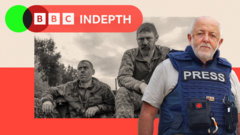In the capital of Kyiv, life appears to have returned to a semblance of normality three years after the onset of the devastating conflict with Russia. Shops bustle and traffic persists in the once besieged city, a stark contrast to the silence and fear that defined those early days of war. Yet, the specter of Ukraine's national extinction looms large once more, fueled by political machinations and a shift in American diplomacy under returning President Donald Trump.
Ukrainians had expressed frustration over the perceived hesitancy of President Joe Biden in providing robust military support. However, the emergence of Trump has complicated the terrain even further. His rhetoric—filled with hyperbole and inaccuracies regarding Ukraine’s role in the conflict—mirrors that of Russian President Vladimir Putin, raising alarm within Ukraine’s leadership including President Volodymyr Zelensky.
Trump’s strategy has baffled seasoned diplomats; he appears to offer concessions to Russia even before negotiations have begun. By implying that Ukraine would not join NATO and suggesting that Russia could retain some of the contested territory, Trump’s remarks have been interpreted as a dangerous softening that emboldens Putin's ambitions.
In Kyiv's fortified government district, Ihor Brusylo, a senior advisor to Zelensky, conveyed the immense pressure Ukraine is under. “It’s very, very tough. These are hard, challenging times,” he acknowledged, reflecting on the determination to resist any encroachment on Ukraine’s sovereignty.
Recent discussions have highlighted a sorrowful irony: while Kyiv's streets have seen a revival, the persistent threat of missiles and drones serves as a grim reminder of ongoing hostilities. The front lines are alive with conflict, as Russian forces attempt a relentless advance in eastern Ukraine, costing countless lives and deforming the landscape once teeming with civilian life.
The stark reality of war continues to touch the lives of ordinary Ukrainians. Young soldiers, eager yet apprehensive, stand at the ready; their experiences fundamentally shaping their identities and futures. These soldiers speak of battling formidable foes, including North Korean troops, in the brutal field of Kursk where they fight to reclaim land and maintain national integrity.
As the US political dynamic shifts, fears grow among the Ukrainian populace that the West may again allow aggressors to dictate terms. Many recognize parallels to historical appeasements and express concern at Trump's apparent admiration for authoritarian regimes, reminiscent of 20th-century leaders who sought to placate aggressors.
In this globally interconnected age, the reverberations of Trump’s policies have ignited apprehension not only in Eastern Europe but across alliances. With uncertainty hanging heavily, observers note that both civilians and soldiers are adapting and persevering, remaining vigilant against an unforgiving backdrop of conflict that has altered their realities irrevocably.
As Ukraine wrestles with the implications of Trump’s administration reaching out to Russia, the plight for sovereignty remains at the forefront of the national consciousness. From soldiers entrenched in combat to youths feeling the pressures of war, every decision made far from their borders feels like a haunting echo of the past, as Ukraine fights tirelessly for its future.
Ukrainians had expressed frustration over the perceived hesitancy of President Joe Biden in providing robust military support. However, the emergence of Trump has complicated the terrain even further. His rhetoric—filled with hyperbole and inaccuracies regarding Ukraine’s role in the conflict—mirrors that of Russian President Vladimir Putin, raising alarm within Ukraine’s leadership including President Volodymyr Zelensky.
Trump’s strategy has baffled seasoned diplomats; he appears to offer concessions to Russia even before negotiations have begun. By implying that Ukraine would not join NATO and suggesting that Russia could retain some of the contested territory, Trump’s remarks have been interpreted as a dangerous softening that emboldens Putin's ambitions.
In Kyiv's fortified government district, Ihor Brusylo, a senior advisor to Zelensky, conveyed the immense pressure Ukraine is under. “It’s very, very tough. These are hard, challenging times,” he acknowledged, reflecting on the determination to resist any encroachment on Ukraine’s sovereignty.
Recent discussions have highlighted a sorrowful irony: while Kyiv's streets have seen a revival, the persistent threat of missiles and drones serves as a grim reminder of ongoing hostilities. The front lines are alive with conflict, as Russian forces attempt a relentless advance in eastern Ukraine, costing countless lives and deforming the landscape once teeming with civilian life.
The stark reality of war continues to touch the lives of ordinary Ukrainians. Young soldiers, eager yet apprehensive, stand at the ready; their experiences fundamentally shaping their identities and futures. These soldiers speak of battling formidable foes, including North Korean troops, in the brutal field of Kursk where they fight to reclaim land and maintain national integrity.
As the US political dynamic shifts, fears grow among the Ukrainian populace that the West may again allow aggressors to dictate terms. Many recognize parallels to historical appeasements and express concern at Trump's apparent admiration for authoritarian regimes, reminiscent of 20th-century leaders who sought to placate aggressors.
In this globally interconnected age, the reverberations of Trump’s policies have ignited apprehension not only in Eastern Europe but across alliances. With uncertainty hanging heavily, observers note that both civilians and soldiers are adapting and persevering, remaining vigilant against an unforgiving backdrop of conflict that has altered their realities irrevocably.
As Ukraine wrestles with the implications of Trump’s administration reaching out to Russia, the plight for sovereignty remains at the forefront of the national consciousness. From soldiers entrenched in combat to youths feeling the pressures of war, every decision made far from their borders feels like a haunting echo of the past, as Ukraine fights tirelessly for its future.




















